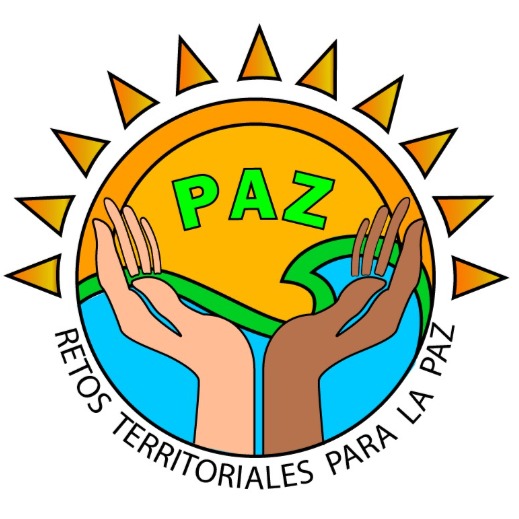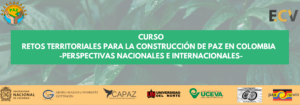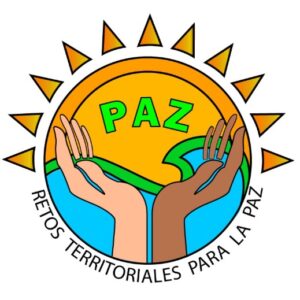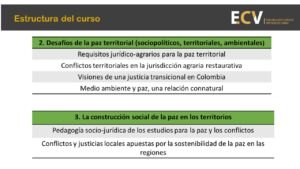
The online course “Territorial challenges for peacebuilding in Colombia -national and international perspectives” begins

January 18, 2022 marked the beginning of the “Territorial Challenges for Peacebuilding in Colombia – International National Perspectives” course intended mainly to provide opportunities for academic reflection on the socio-legal, environmental, and territorial difficulties that are hindering peacebuilding in Colombia, South America, and the world, in order to weave interdisciplinary knowledge that can shed light on the possible alternatives in terms of developing environments where the integrity of people’s lives is privileged. This course is part of the CAPAZ School of Online Courses, and is being taught in partnership with Universidad Nacional de Colombia, Göttigen University, and Universidad del Norte.
Forty-one students from different areas of knowledge are enrolled on the course, 35 graduate students and 6 undergraduate students. There are representatives from 16 of the country’s regions and 4 who are connecting from Mexico, Brazil, and the United States. The participants stand out for their extensive experience in academic, socio-political, and pedagogical work, their excellent understanding of the problems that afflict the regions and their structural connection with the country’s environment. The group’ s multiplicity of characteristics will ensure that the course has an impact on peacebuilding in Colombia, in both academic and experiential terms.
The opening session
The opening ceremony was led by the course coordinator, research professor Mariela Sánchez Cardona, with special participation by cooperating partners, Professor José Martínez from the University of Göttigen, and Professor Bernd Marquardt from Universidad Nacional de Colombia. The course’s academic team, Professor Alicia Uribe Taborda and research manager Juan Daniel Forero participated in the session.
The first session addressed the course’s academic, pedagogical, and technical issues, specifying that it will be held online, through synchronous video-calls and a learning management platform that will include reading materials, the recording of the session and an interactive summary of each class. The course will be marked by three thematic axes that will focus on the review, analysis, and construction of territorial peace in Colombia:
- The socio-legal panorama of peace: Exposes and problematizes the main panoramic visions
 (national and international) on peacebuilding from different perspectives.
(national and international) on peacebuilding from different perspectives. - The challenges of territorial peace: Exposes and analyses the social, political, territorial/agrarian and environmental variables that impede the implementation of peace in Colombia.
- The social construction of peace in the territories: Proposes research, management, and creation strategies, from interdisciplinary contexts, for peacebuilding from territorial approaches.

The academic space is based on a methodology intended to promote constructive critical thinking, revealing how the topics addressed in class can contribute to developing socio-legal strategies that deal with the problems and/or possible solutions for a dignified life for people and communities in the regions, based on the creation of written or audiovisual products. It is also intended to strengthen the Territorial Challenges for the Peacebuilding Network, formed by the knowledge gathered from the students and teachers involved in the first version of the course.
At the end of the session, the students showed great interest in working on the topics and the need for spaces where they can create collective knowledge, respect for differences, and opportunities to listen without stigmatisation. They were also committed to forming a study group that addresses academic issues, where they can express their frustrations, talk about their dreams and experiences, without fear or social reprisals.




 (national and international) on peacebuilding from different perspectives.
(national and international) on peacebuilding from different perspectives.